by Gina Brummett | Apr 8, 2020 | Devotions
 This week I had an interesting discussion with my neighbor, who is an account executive and a committed Christian. She described the challenges working from home while we are trying to “slow the spread” of COVID-19. Sure, there are some issues with technology, but she said the greatest issues are “people issues”. When structure and strategy have been interrupted, there is tension, irritability and panic. We talked in general terms about how differently people respond who are in relationship with our Lord Jesus. His peace – and every fruit of the Spirit- is spotlighted in times like these. (See Galatians 5:22-24). My pastor husband says it this way: “The darker the dark the brighter the light!”
This week I had an interesting discussion with my neighbor, who is an account executive and a committed Christian. She described the challenges working from home while we are trying to “slow the spread” of COVID-19. Sure, there are some issues with technology, but she said the greatest issues are “people issues”. When structure and strategy have been interrupted, there is tension, irritability and panic. We talked in general terms about how differently people respond who are in relationship with our Lord Jesus. His peace – and every fruit of the Spirit- is spotlighted in times like these. (See Galatians 5:22-24). My pastor husband says it this way: “The darker the dark the brighter the light!”
When I contemplate 1 Thessalonians 4:13 (…we do not grieve as those without hope) it occurs to me that this Scripture could apply to a number of emotions and experiences (i.e. anger, financial setbacks, health crises, etc.) Our Living Hope enables us to respond differently.
If we want to shame complainers, the stock illustration is the liberated but grouchy Israelites in search of their Promised Land. The following passage describes their crisis at Marah, where there was no fresh water.
So Moses brought Israel from the Red Sea; then they went out into the Wilderness of Shur. And they went three days in the wilderness and found no water. Now when they came to Marah, they could not drink the waters of Marah, for they were bitter. Therefore, the name of it was called Marah. And the people complained against Moses, saying, “What shall we drink?” So he cried out to the Lord, and the Lord showed him a tree. When he cast it into the waters, the waters were made sweet. (Exodus 15:22-25)
So what can we put into our difficult – even bitter –circumstances that will make life sweet again? For Moses it was a log (or tree). Symbolically, it is the same for us. The “tree” is Calvary’s Cross, where Jesus gave everything for us. Let’s invite Him into every situation.
As we approach Good Friday and Resurrection Sunday, remember that the bitter, polluted “waters” can be made sweet again by His presence.
by Jim Brummett | Apr 7, 2020 | Devotions
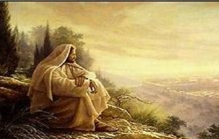 On Tuesday of Holy Week, Jesus returned to Jerusalem, passed the withered fig tree and used it as an illustration of the power of placing our faith in God. When they returned to the Temple, religious leaders publicly challenged him, asking “By what authority are you doing these (miracles)? And who gave you this authority?” (Matthew 21:23). That conversation did not go well for the leaders, as Jesus called them “blind guides…whitewashed tombs full of dead people’s bones and all sorts of impurity, filled with hypocrisy and lawlessness…” (23:24-33). Notice, He did not try to defend himself nor give credence to his critics. There is probably a lesson there for us today. A little while later that day, Judas negotiated with the Sanhedrin to betray Jesus (Matthew 26:14-16).
On Tuesday of Holy Week, Jesus returned to Jerusalem, passed the withered fig tree and used it as an illustration of the power of placing our faith in God. When they returned to the Temple, religious leaders publicly challenged him, asking “By what authority are you doing these (miracles)? And who gave you this authority?” (Matthew 21:23). That conversation did not go well for the leaders, as Jesus called them “blind guides…whitewashed tombs full of dead people’s bones and all sorts of impurity, filled with hypocrisy and lawlessness…” (23:24-33). Notice, He did not try to defend himself nor give credence to his critics. There is probably a lesson there for us today. A little while later that day, Judas negotiated with the Sanhedrin to betray Jesus (Matthew 26:14-16).
In the afternoon Jesus returned to the Mount of Olives and gave a prophecy about the destruction of Jerusalem at the end of the age, His Second Coming and the final judgment. He was drawing the attention of his followers away from the drama and nonsense from unbelievers, to the plans God had in store for their future. I believe Jesus himself was looking past the agonizing events of the coming days, to the joy that was just around the corner.
In the evening, Jesus and the disciples returned to Bethany to spend the night.
Oh beloved, please don’t be preoccupied with the challenges of today. Don’t get lured into the fear and doubt that is so prevalent in our culture. Devour the word of God and keep your focus on His promises. Isaiah 26:3 reads “You will guard him and keep him in perfect and constant peace whose mind [both its inclination and its character] is stayed on You, because he commits himself to You, leans on You, and hopes confidently in You.”(AMP). God is faithful and His words are true. In the words of our Lord, “Heaven and earth will pass away, but my words will by no means pass away” (Matthew 24:35).
Let’s sing: “This world is not my home, I’m only passing through; my treasures are laid up somewhere beyond the blue. The angels beckon me from heaven’s open door, and I can’t feel at home in this world anymore…”
Scripture reading for Tuesday: Matthew 21:23–24:51, Mark 11:20–13:37, Luke 20:1–21:36, and John 12:20–38
by Jim Brummett | Apr 6, 2020 | Devotions
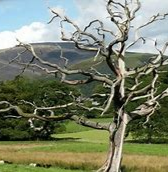 This week in our daily devotions, we will consider the activities of our Lord during Holy Week.
This week in our daily devotions, we will consider the activities of our Lord during Holy Week.
On Monday, Jesus and his disciples walked the two miles from Bethany to Jerusalem. Along the way he cursed a fig tree because it had failed to bear fruit. There are two lessons to glean from this story. First it represented God’s judgment on spiritually dead religious leaders. In 2 Timothy 3:5 Paul warned Timothy of people with a “form” of godliness, but they deny the power. They go through the motions and maintain all the external form of religion, but know nothing of the power of God to genuinely change lives. Paul told Timothy to “turn away” from such people. In these troubling times, I pray for our community to find in the Church a true representation of the love and power that Almighty God has to offer. Secondly, He used this experience to illustrate the power of prayer and faith. According to Matthew 21:19 immediately after He cursed the tree it “withered away.” Jesus followed this up with the admonition “whatever things you ask when you pray, believe that you receive them and you will have them” (Mark 11:24).
In Jerusalem He returned to the Temple and saw two offenses. First, animals were being sold for sacrifices at exorbitant prices, and secondly, foreign money exchanged for temple gifts were subject to taxes and a high exchange rate. Both of these offenses were for the financial benefit of the priests and Pharisees. In anger, Jesus overturned tables and drove the money changers out, saying “The Scriptures declare, ‘My Temple will be a house of prayer,’ but you have turned it into a den of thieves” (Luke 19:46).
I can’t help but see a parallel between Jesus cursing a barren fig tree and rebuking religious leaders for failing the people while padding their bank accounts. God wanted the temple to be a house of prayer for all people, not just the wealthy. He still does.
Let me encourage you, that in a culture of spiritual barrenness, we can be believers who take God at His word, pray in faith, and believe Almighty God to do the miraculous.
Scriptures for Monday: Matthew 21:12–22, Mark 11:15–19, Luke 19:45-48, and John 2:13-17.
by Gina Brummett | Apr 3, 2020 | Devotions
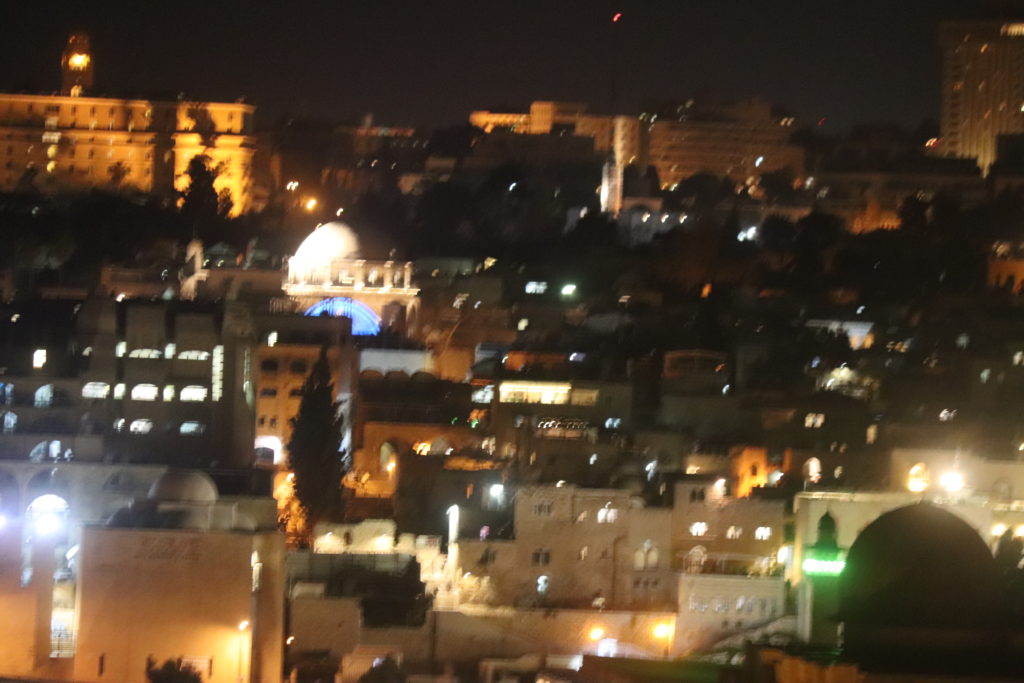
A night view of Jerusalem from atop the Mount of Olives was our special treat only a few of hours after arriving in Israel. Majestic and beautiful only begin to describe the scene. When we returned in the daylight, this iconic view of Jerusalem was equally inspiring, looking across the Kidron Valley to the Old City landmarks (Temple Mount, Church of the Holy Sepulcher, Russian Orthodox Church of Mary Magdalene and more).
The Mt. of Olives is the location where Jesus spent much of His last week on earth; it is the site from which He ascended to heaven after His resurrection, and where He will one day return to earth. It is somewhat surreal to stand in this spot as you remember its history and look forward to its future.
Another cause for wonder in this place is the Jewish cemetery covering the slopes of the Mount of Olives. The cemetery contains anywhere between 70,000 and 150,000 tombs from various periods, including the tombs of famous figures in Jewish history.
We noticed rocks and pebbles piled on the graves – some more than others. We learned that Jewish tradition is to place rocks, rather than flowers, whenever the grave is visited. This lets the family know that someone cared enough to visit the grave. It communicates that the loved one is still thought about and missed. A logical conclusion might be more rocks = more love and respect for the departed.
Hopefully, the same respect was given during the person’s lifetime. Some have said (maybe in jest but with an element of sincerity), “Don’t send flowers when I die; bring them while I’m alive!” The Scriptures instruct us to pay special attention to the way we honor others, especially our elders, our Christian brothers and those in authority.
Honor your father and your mother, so that you may live long in the land the Lord your God is giving you. (Exodus 20:12)
Be devoted to one another in love. Honor one another above yourselves. (Romans 12:10)
Honor all people. Love the brotherhood. Fear God. Honor the king. (1 Peter 2:17)
So whether we’re talking about rocks or flowers, a good rule to follow is that we express our devotion sincerely while there is opportunity.
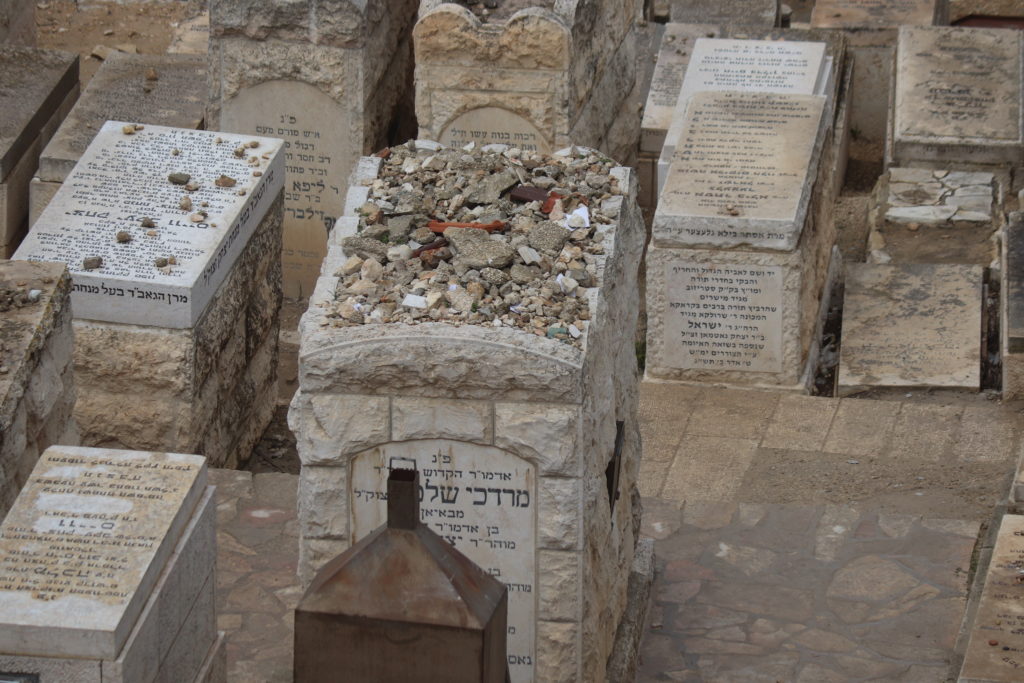
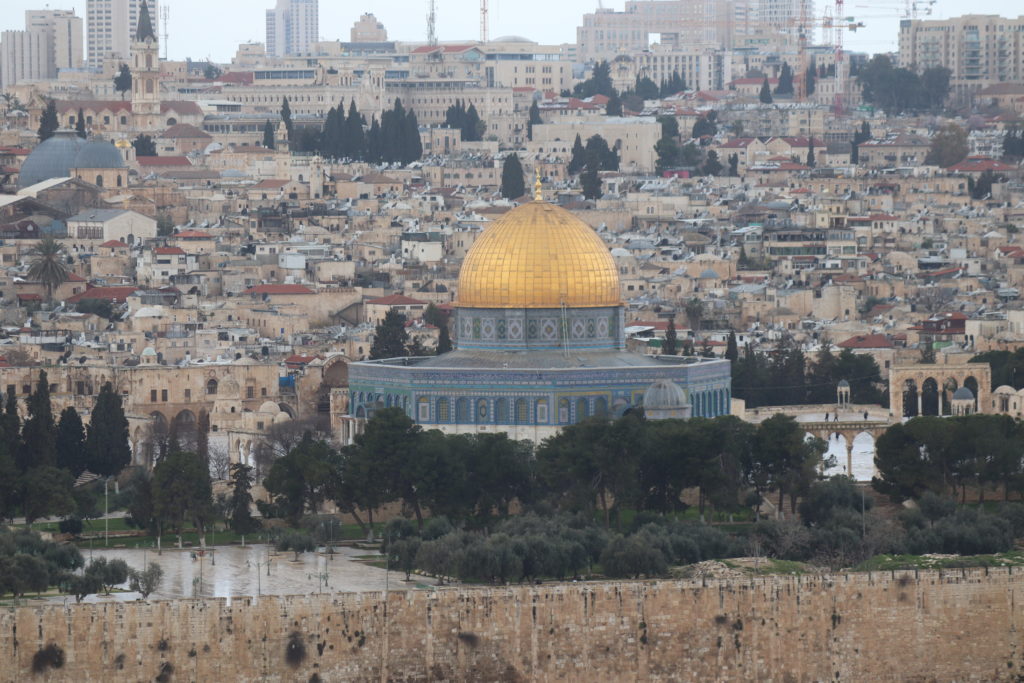
by Jim Brummett | Apr 2, 2020 | Devotions
.Romans 1:8 First, I thank my God through Jesus Christ for you all, that your faith is spoken of throughout the whole world.
One of the greatest memories I have from our recent trip to Israel was the time spent in reading the word, worship and prayer with fellow believers. The number of people in Israel who are followers of Christ are few, which means relationships between believers is precious and appreciated.
In our condo in Jerusalem we read scripture, sang and prayed before visiting the Mount of Olives. In the days that followed we also read the scriptures at places like Beth-Shemesh where the Philistines returned the Ark of the Covenant to the Jews (1 Samuel 6), and the Valley of Elah where David killed Goliath (1 Samuel 17). Sharing these times of worship and prayer with Gina’s cousins Jeanie, Scott, and Laura were precious. Scott and Laura lived in Israel for nine years, pastoring and planting churches. We had the privilege of participating in a Bible study and prayer meeting in one of those churches, in the city of Qiryat Shemona, located near the Lebanese border. To the best of our knowledge it is the only Christian congregation north of the Sea of Galilee. You can imagine our relief when they opted to speak in English rather than Hebrew during our meeting.
The pastor’s name is Israel, the gentleman in the white shirt standing to my right in the photo, and his wife Marci is the lady in the green dress on the far left of the photo. Israel’s father was a rabbi. When Israel came to Christ he was the first Christian in his village. Standing to his right is Daniel from the village of Metula located on the Lebanese border. He and his wife are the only believers in their community. Daniel has a gentle spirit and a genuine love for God and the Bible. The gentleman in the cowboy hat is Zach, from Pastor Robert Morris’ church in Texas. Zach moved to Israel years ago, and attended the church Scott and Laura planted in Tel Aviv. He is a gifted carpenter who used his skills to paint and remodel the church building. Others were from South Africa and Lithuania.
I can’t tell you the theology of those I worshipped with that night, other than they all believed in Jesus Christ the Son of God who died on the cross for our sins; they believed in the authority of God’s Word and they believed in the power of prayer.
Pastor Israel led an hour-long discussion on the scriptures, and afterward we spent an hour in prayer. Brothers and sisters whom we met only an hour before prayed aloud for Gina’s brother Ron who is in Craig Hospital paralyzed from a motorcycle accident. They prayed for Gina and me and our congregation, and they prayed for their friends and relatives who are not saved. We were deeply moved, knowing “the fervent prayer of a righteous man accomplishes much” (James 5:16). As we prayed, the sweet aroma of the presence of the Holy Spirit filled that place. Oh, how it filled that place and our hearts.
I am praying for the presence of the Holy Spirit to fill your hearts and homes and you spend time with Him in your prayer closet.
Let’s sing: O come to the altar, the Father’s arms are open wide…
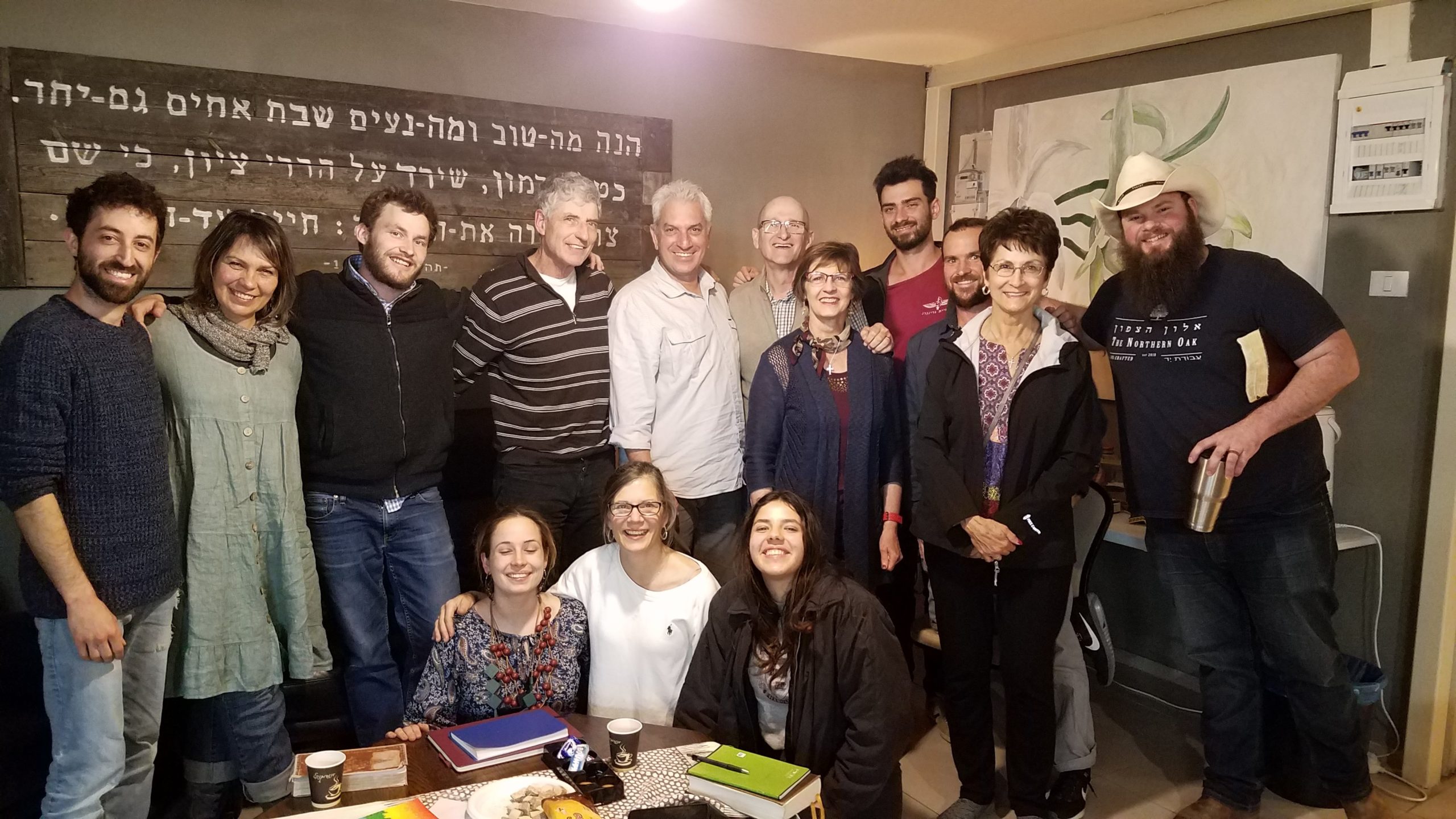
by Gina Brummett | Apr 1, 2020 | Devotions
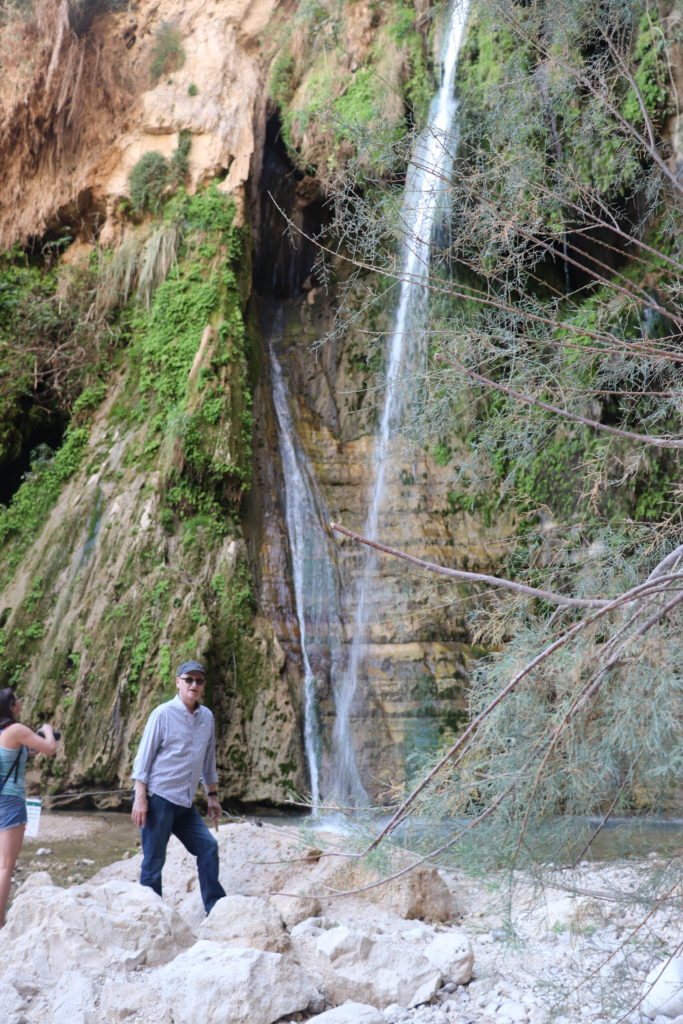
Waterfall at En Gedi National Reserve
We tracked a LOT of steps touring Israel, and a couple of times I took a picture of my foot (dipping my toe into the Sea of Galilee, for example). Very often and in many places I mused, “Just think, I’m stepping right where [Bible character] did!” That happened as we hiked the En Gedi Nature Reserve, and we talked about David hiding there from King Saul. (1 Samuel 24)
King Saul, paranoid and jealous of David’s success and rising popularity, was searching for David to take his life. If it were a movie, this would be one of the cliff hangers, with a little comedy thrown in. Saul is scouring the landscape and suddenly needs a “pit stop”. He darts into a cave, and amazingly it is the same cave where David and some of his men are hiding. While Saul’s guard (and his garments) are down, David creeps near him with the incredible opportunity to save his own life by taking Saul’s! But David, at the last second, redirects his spear and slices off a corner of Saul’s robe. The Bible tells us that David was ashamed of himself as he held that slice of cloth and envisioned what he had nearly done – taken the life of his king.
Oblivious, Saul leaves the cave to resume his search, and David runs out into the open air, calling after Saul. Desperately trying to convince Saul that he means him no harm, David produces the patch of cloth. Saul must have turned as white as the foamy water cascading down the nearby cliff as he grabbed his robe and verified his close call with death.
Actually, I think both men were dumbfounded as they held in their hands evidence of “what almost was”. I wonder if that bit of Saul’s robe ended up somewhere that David saw it often and remembered that God kept him from an action that he would regret. I wonder if Saul refused to have the robe mended, so that he would remember David’s mercy. The succeeding chapters reveal other occasions when David remembered to be merciful (and times when Saul forgot).
Still, a swatch of fabric reminds us about mercy. I like mementos (hence the sneaker photos), and I’m thinking that Jesus likes mementos, too. He gave us the idea – command, actually – to partake of communion together as a reminder of His sacrificial death. (Matthew 26:26; 1 Corinthians 11:26) “As often as we do it”, we hold in our hands a little juice and bread as evidence that “what almost was“ (our death penalty) mercifully was replaced by eternal life.
by Jim Brummett | Mar 31, 2020 | Devotions
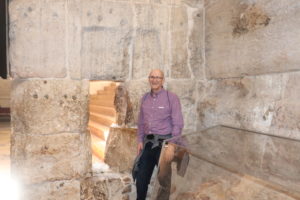
Mark 10:25 It is easier for a camel to go through the eye of a needle than for a rich man to enter the kingdom of God.
The imagery of this verse was made real to me in our recent trip to Israel. The “eye of a needle” was a small opening at a city gate and measured approximately 3 feet high and 18 inches wide. Entering through the eye was a tight squeeze for an adult and an impossibility for a large animal like a camel.
This teaching moment is brought to you by a rich young man who asked Jesus what was necessary for him to receive eternal life (Mark 10:17). Jesus told him to honor the moral principles of the Mosaic Law through his actions and attitudes. Then in a serious test of the young man’s values, the Lord instructed him to “sell what you have and give to the poor, and you will have treasure in heaven; and come, follow me” (V.21). Verse 22 states the young man “went away sorrowful, for he had great possession.”
It is worth noting that Jesus didn’t challenge the man’s commitment to God. Look at verses 19-20 and you will see he had check all the right boxes in regards to spiritual disciplines. Don’t commit adultery – check. Don’t murder – check. Don’t steal – check. Don’t bear false witness – check. Don’t defraud – check. Honor your father and mother – check. The man was deeply religious.
It is also worth noting that Jesus did not condemn the man for his wealth. Wealth is not sinful, for it can be used to spread the gospel and provide assistance for people in need. The problem wasn’t the man’s wealth, but the value he placed on it. Jesus wanted to see what price the man was willing to pay for the privilege of being a disciple, and in the process challenged him to place greater value on service than possessions. Read again the accounts of Jesus recruiting His disciples and take note that He asked each of them to walk away from something before they walked with Him in service. Peter, James and John left a lucrative fishing business. Matthew walked away from a successful career as a tax collector. Jesus left the throne room of heaven to pick up a towel and basin to wash feet. Somewhere I heard it said, the value of a man is not measured in what he accumulates, but gives away.
Dr. Adam Clarke was an esteemed scholar, theologian and preacher of the 19th century. On his tomb in London is carved the figure of a candle that had been reduced by use. Beneath the candle are the words, “In giving light to others, I myself have been consumed.”
Let’s sing: “To be used of God to sing, to preach, to pray. To be used of God, to show someone the way…”
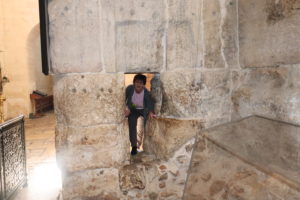
by Jim Brummett | Mar 30, 2020 | Devotions
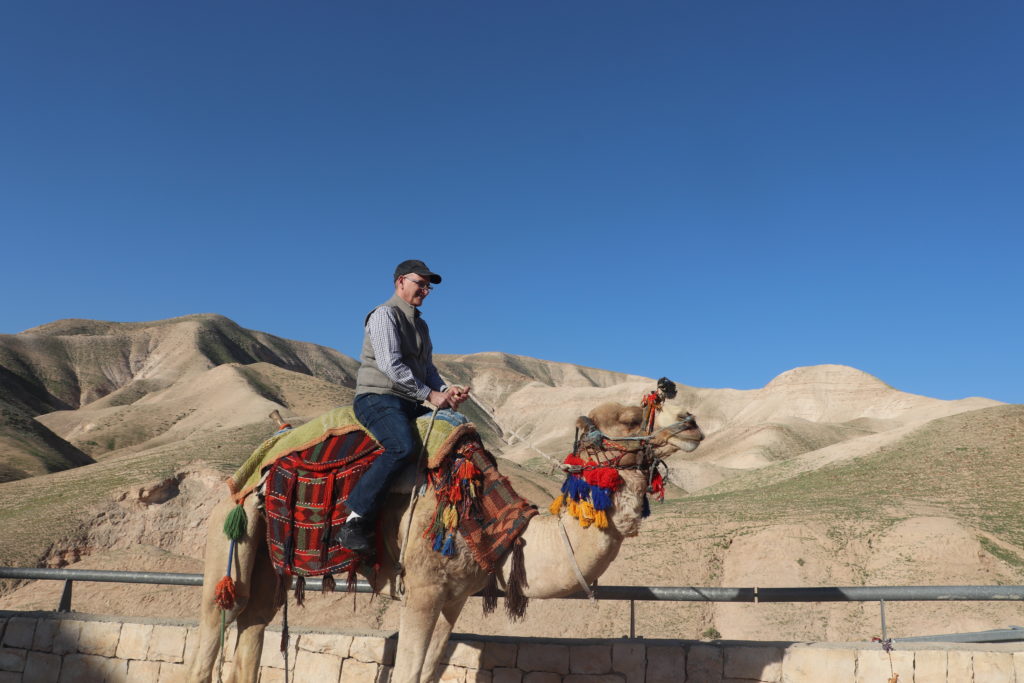 On our second full day in Israel we travelled south from Jerusalem to Masada. Along the way we met a Bedouin young man named Achmed and rode his camel named Sushi. Yes, I have pictures. Over the years I have ridden a donkey (thank you Paul Scholtz), a cow (don’t ask), a hog (two wheel version) a horse, a high-horse, and now – a camel.
On our second full day in Israel we travelled south from Jerusalem to Masada. Along the way we met a Bedouin young man named Achmed and rode his camel named Sushi. Yes, I have pictures. Over the years I have ridden a donkey (thank you Paul Scholtz), a cow (don’t ask), a hog (two wheel version) a horse, a high-horse, and now – a camel.
A short drive later we arrived at Masada, an ancient fortress situated on top of a large plateau a couple of miles west of the Dead Sea. Its cliffs rise 1,300 feet on the east and 300 feet on the west, making it an ideal refuge from danger. Herod the Great built two palaces there which he used as winter retreats. The fortress contained barracks for an army and cisterns to collect rain water. They grew pigeons for their meat and had a system in place where they could have grain for their food. It was developed to be a self-contained home effectively shut off from the rest of the world.
Historian Josephus wrote that when the Roman troops invaded Jerusalem around A.D. 70, hundreds of Jewish people fled to Masada. As we stood atop Masada, I could see why the Jewish people thought they were safe from threat. From that vantage point you could see the Dead Sea to the east, the plains and hills for many miles giving you early warning of danger. The Roman army continued its march south and encircled the plateau. The Romans were relentless and spent months building a 400 foot ramp from the desert floor to the western wall of the fortress. When the Romans breached the wall they discovered that 960 men, women and children had committed suicide so as to avoid being captured. Only two women and five children were found alive.
Pardon the over-simplification of my thoughts this morning, but I see a parallel with the story of Masada and what is happening in our world today. Just a few weeks ago our economy was soaring, and we had little worries. Now millions of people are out of work, hundreds of thousands have reportedly been infected and thousands have died. Last Friday morning I preached the funeral of a 50 year old man who had been the epitome of health and success, but was struck down by this insidious virus. I stood at Stewart’s grave with the reminder of how precious life is and how quickly it can change.
I do not advocate we live in fear, but urge all to exercise wisdom and cooperate with the mandates given by civic and medical leaders. I believe we can be proactive in this season of isolating ourselves from the threat. Begin each day giving thanks to the Lord for His rich blessings, and spend time in the scripture, in worship and prayer. Be purposeful in looking out for your neighbors, which fits in with the Lord’s teaching to “love your neighbor as yourself” (Matthew 22:39). Pray scriptures like Psalm 91 over your property and family, then place your trust in Almighty God, knowing that He is with us in every season of life (see Matthew 28:20), and He promised to never leave us nor forsake us (Hebrews 13:5).
Let’s sing: “The name of the Lord is a strong tower, the righteous run into it and they are safe…”
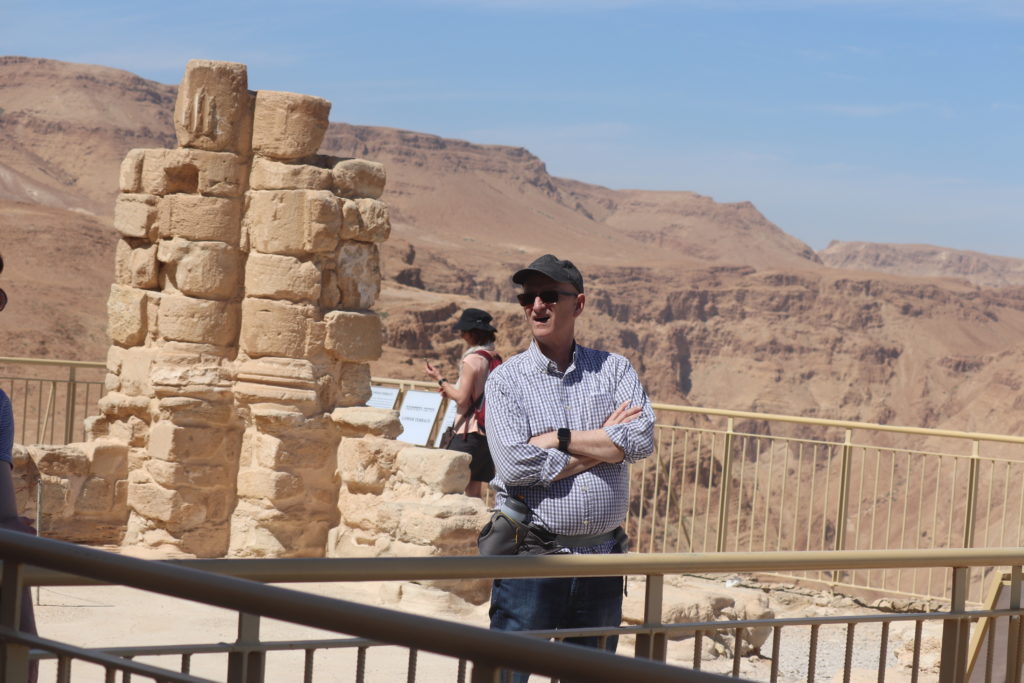
by Gina Brummett | Mar 26, 2020 | Devotions
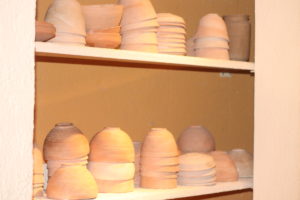 My women’s ministries friends, aka the “WMs” – who’ve attended hundreds of Bible studies and served even more community meals– will love learning about Qumran! We were privileged to visit this archeological discovery on our second tour day in Israel.
My women’s ministries friends, aka the “WMs” – who’ve attended hundreds of Bible studies and served even more community meals– will love learning about Qumran! We were privileged to visit this archeological discovery on our second tour day in Israel.
Located near the Dead Sea, Qumran’s fame comes from a break-away sect, known as the Essenes, who lived and studied there. In the surrounding caves, they left a magnificent legacy that we now call the Dead Sea Scrolls.
From the Qumran National Park publication: “The Essenes paid great attention to ritual bathing and purity. They lived a communal life in a settlement that was constructed to make them as self-reliant as possible. They had assembly halls, a central dining room in which ceremonial meals were eaten, a kitchen, ritual baths, a laundry room, a watch tower, a stable and a pottery workshop. Of special interest is the Scriptorium – the writing room – with its desks and ink stands, where the Essene scribes probably wrote most of the scrolls found in the adjoining caves.”
I loved learning that archeologists unearthed a dining and meeting hall and, in a nearby pantry, hundreds of pottery tableware pieces “neatly arranged in piles”. Give it up for a well-organized church kitchen that survived centuries and an earthquake!
Seriously, not too far removed in time or distance (by today’s standards) the early Christians were gathering around “the good book” and the table. “Day after day they met together in the temple. They broke bread together in different homes and shared their food happily and freely.” (Acts 2:46, CEV)
I wonder about the first follower of Christ who purposely came to the table “unwashed”. Who was the brave one who did not lather his hands, just so he could set up a dialogue that he’d first overheard from the lips of Jesus?
When Jesus finished speaking, a Pharisee invited him home for a meal. Jesus went and sat down to eat. The Pharisee was surprised that he did not wash his hands before eating. So, the Lord said to him: You Pharisees clean the outside of cups and dishes, but on the inside, you are greedy and evil. (Luke 11:38-39)
Currently, in the middle of the coronavirus pandemic, we’re constantly reminded, “Wash your hands!” That’s not only beneficial but necessary! Of even greater importance, though, is the need to cleanse our hearts. Scripture tells us:
Come near to God and he will come near to you. Wash your hands,
you sinners, and purify your hearts, you double–minded. (James 4:8)
Who may ascend the mountain of the Lord? Who may stand in his holy place? The one who has clean hands and a pure heart, who does not trust in an idol or swear by a false god. (Psalm 24:3-4)
So, let’s continue washing our hands and, at the same time, let’s allow the Holy Spirit to scrub our hearts and minds with the “soap” of God’s Word! (See Ephesians 5:26)
Stay safe, keep clean and be healthy!
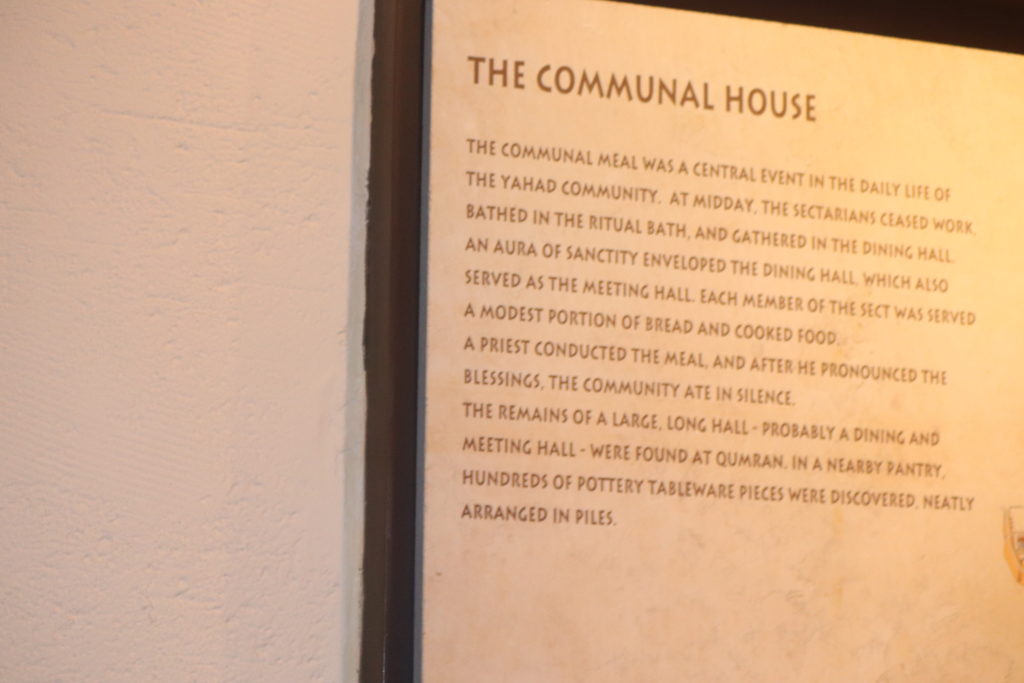
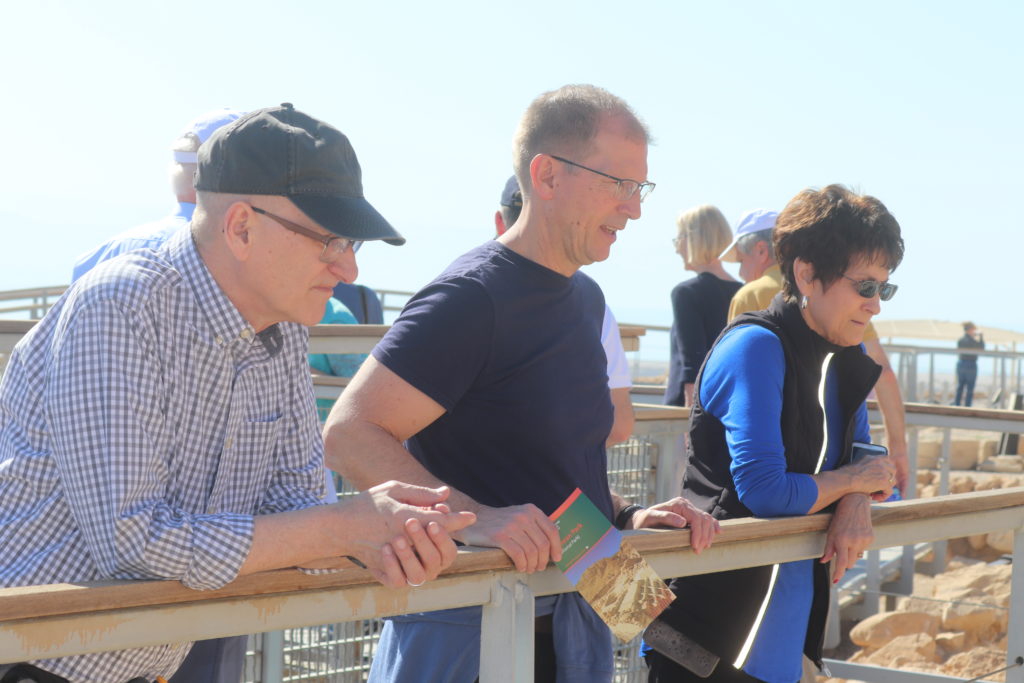
Jim, Scott and Jeanie looking into one of the many ritual baths uncovered at Qumran
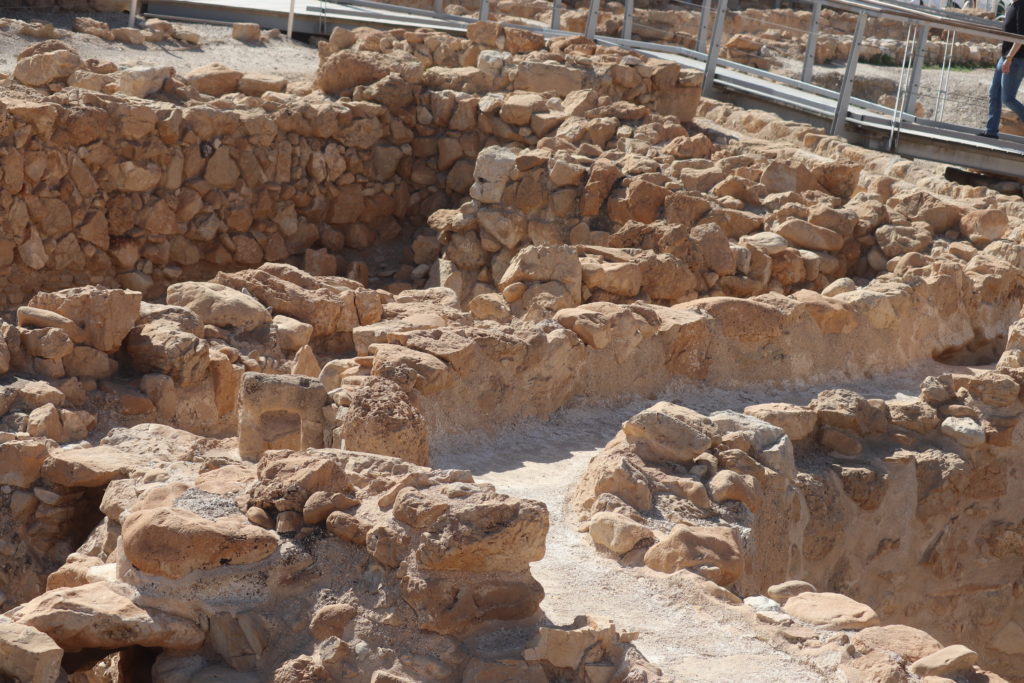
Ritual bath
by Jim Brummett | Mar 25, 2020 | Devotions
In our recent trip to Israel, we spent our first full day in Jerusalem. One of the highlights of the day and trip was spending time in the upper room. We stood in the room for several minutes and I thought of all that had happened in that room so many years ago.
The days leading to His arrest, Jesus spent time in Jerusalem and the surrounding area. According to Matthew 26, in the hours leading up to his prayer in Gethsemane and arrest, Jesus spent the afternoon and evening privately with his disciples. It was at that time he shared what we refer to as The Lord’s Supper with his disciples, washed their feet and released Judas to carry out his plan of betrayal. It is believed by many these events took place in this upper room.
After Jesus’ resurrection, He met with His disciples several times. John 20 records one of those meetings. The scene was in a home in Jerusalem, and was likely once again the upper room. The purpose of that particular meeting was for Jesus to visit with Thomas and help him deal with his confusion and struggles related to the Lord’s death. Read John 20 again and take note of the gentle way Jesus interacted with Thomas.
A little over a month later, moments before Jesus ascended to heaven He instructed his followers to return to Jerusalem and “wait for the Promise of the Father” (Acts 1:4). Verse 13 states they returned to the upper room where they had been staying. Shortly thereafter, on the Day of Pentecost, 120 followers of Christ gathered in that large room and “all were filled with the Holy Spirit and began to speak with other tongues as the Spirit gave them utterance” (Acts 2:4).
As we stood in the upper room, I imagined all he weighty experiences that took place in that room 2,000 years ago. The Supper, washing feet, Thomas being restored from a state of confusion and discouragement, and then the outpouring of the Holy Spirit. Oh, if only those walls could talk!
Let us also consider the significant experiences in our personal life journey. During this time of quarantine, you can share communion in your home, either alone or with your family. We are restricted from meeting together, but we are not alone. We can use the phone and internet to connect with others and chat about our own experience with the Lord. We, like those 2,000 years ago, can turn a room in a home into an altar and experience the great outpouring of the Holy Spirit.
Let’s sing: “They were in an upper chamber, they were all in one accord when the Holy Ghost descended as was promised by our Lord…”
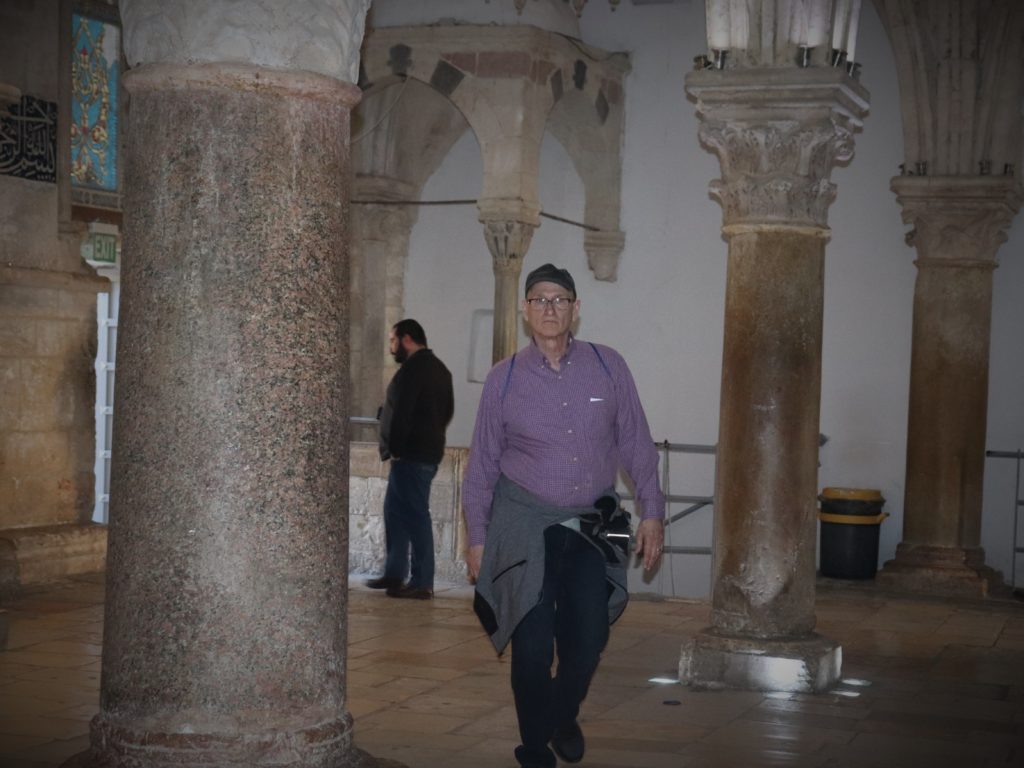
The Upper Room is in the southern part of the Old City of Jerusalem on Mount Zion and is perhaps best known as the traditional site of the Last Supper. The current structure of the room dates approximately from the fourteenth century, which accounts for the existing Gothic-era columns.
 This week I had an interesting discussion with my neighbor, who is an account executive and a committed Christian. She described the challenges working from home while we are trying to “slow the spread” of COVID-19. Sure, there are some issues with technology, but she said the greatest issues are “people issues”. When structure and strategy have been interrupted, there is tension, irritability and panic. We talked in general terms about how differently people respond who are in relationship with our Lord Jesus. His peace – and every fruit of the Spirit- is spotlighted in times like these. (See Galatians 5:22-24). My pastor husband says it this way: “The darker the dark the brighter the light!”
This week I had an interesting discussion with my neighbor, who is an account executive and a committed Christian. She described the challenges working from home while we are trying to “slow the spread” of COVID-19. Sure, there are some issues with technology, but she said the greatest issues are “people issues”. When structure and strategy have been interrupted, there is tension, irritability and panic. We talked in general terms about how differently people respond who are in relationship with our Lord Jesus. His peace – and every fruit of the Spirit- is spotlighted in times like these. (See Galatians 5:22-24). My pastor husband says it this way: “The darker the dark the brighter the light!”
 On Tuesday of Holy Week, Jesus returned to Jerusalem, passed the withered fig tree and used it as an illustration of the power of placing our faith in God. When they returned to the Temple, religious leaders publicly challenged him, asking “By what authority are you doing these (miracles)? And who gave you this authority?” (Matthew 21:23). That conversation did not go well for the leaders, as Jesus called them “blind guides…whitewashed tombs full of dead people’s bones and all sorts of impurity, filled with hypocrisy and lawlessness…” (23:24-33). Notice, He did not try to defend himself nor give credence to his critics. There is probably a lesson there for us today. A little while later that day, Judas negotiated with the Sanhedrin to betray Jesus (Matthew 26:14-16).
On Tuesday of Holy Week, Jesus returned to Jerusalem, passed the withered fig tree and used it as an illustration of the power of placing our faith in God. When they returned to the Temple, religious leaders publicly challenged him, asking “By what authority are you doing these (miracles)? And who gave you this authority?” (Matthew 21:23). That conversation did not go well for the leaders, as Jesus called them “blind guides…whitewashed tombs full of dead people’s bones and all sorts of impurity, filled with hypocrisy and lawlessness…” (23:24-33). Notice, He did not try to defend himself nor give credence to his critics. There is probably a lesson there for us today. A little while later that day, Judas negotiated with the Sanhedrin to betray Jesus (Matthew 26:14-16). This week in our daily devotions, we will consider the activities of our Lord during Holy Week.
This week in our daily devotions, we will consider the activities of our Lord during Holy Week.






 On our second full day in Israel we travelled south from Jerusalem to Masada. Along the way we met a Bedouin young man named Achmed and rode his camel named Sushi. Yes, I have pictures. Over the years I have ridden a donkey (thank you Paul Scholtz), a cow (don’t ask), a hog (two wheel version) a horse, a high-horse, and now – a camel.
On our second full day in Israel we travelled south from Jerusalem to Masada. Along the way we met a Bedouin young man named Achmed and rode his camel named Sushi. Yes, I have pictures. Over the years I have ridden a donkey (thank you Paul Scholtz), a cow (don’t ask), a hog (two wheel version) a horse, a high-horse, and now – a camel.
 My women’s ministries friends, aka the “WMs” – who’ve attended hundreds of Bible studies and served even more community meals– will love learning about Qumran! We were privileged to visit this archeological discovery on our second tour day in Israel.
My women’s ministries friends, aka the “WMs” – who’ve attended hundreds of Bible studies and served even more community meals– will love learning about Qumran! We were privileged to visit this archeological discovery on our second tour day in Israel.


